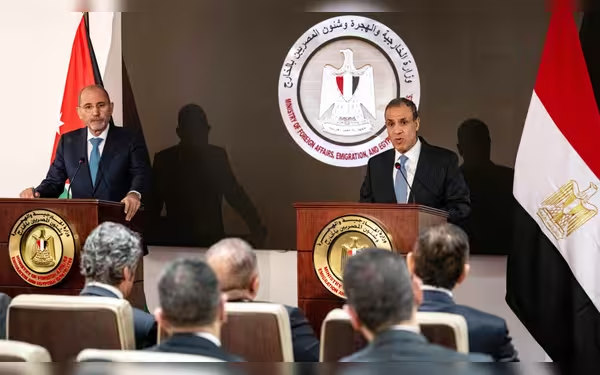Saturday, November 16, 2024 07:57 PM
Egypt And Jordan Support Lebanon Against Israeli Aggression
- Egypt and Jordan condemn Israeli actions in Lebanon.
- Over 1,150 casualties reported due to ongoing violence.
- Calls for dialogue to ensure civilian safety and stability.
 Image Credits: arabnewspk
Image Credits: arabnewspkEgypt and Jordan express support for Lebanon amid escalating Israeli aggression, urging dialogue for peace and civilian safety.
In recent weeks, tensions in the Middle East have escalated significantly, particularly concerning the ongoing conflict involving Israel and its neighbors. The situation has drawn international attention, especially as the foreign ministers of Egypt and Jordan, the only two Arab nations that have established peace treaties with Israel, have publicly voiced their support for Lebanon amidst what they describe as Israeli 'aggression.'
During a joint news conference held in Cairo, Jordanian Foreign Minister Ayman Safadi and his Egyptian counterpart Badr Abdelatty condemned the actions of Israel, which they claim are occurring on multiple fronts: in Gaza, the occupied West Bank, and now Lebanon. Safadi stated, 'We condemn the Israeli aggression on Lebanon, we condemn Israel’s shelling of the Lebanese capital, we condemn Israel’s killing of Lebanese citizens.' This strong language underscores the gravity of the situation and the concerns of neighboring countries.
Both Egypt and Jordan have expressed their fears that the region is teetering on the edge of a larger conflict. They have accused Israel of being shielded by its Western allies, allowing it to act without accountability and to violate international law. Abdelatty remarked, 'You have a country that finds itself above the law and unaccountable,' highlighting the frustration felt by many in the Arab world regarding the perceived double standards in international relations.
Since September 23, Israel has intensified its military operations against Hezbollah positions in Lebanon, resulting in a tragic loss of life, with reports indicating that at least 1,150 individuals have died. The violence has also led to a humanitarian crisis, forcing over a million people to flee their homes in search of safety. As Israel continues its military campaign against Hamas in Gaza, it has also prioritized securing its northern border with Lebanon, aiming to facilitate the return of tens of thousands of Israelis who have been displaced due to Hezbollah's cross-border attacks.
The situation remains fluid, and the potential for further escalation looms large. As the international community watches closely, the calls for peace and stability in the region grow louder. It is crucial for all parties involved to engage in dialogue and seek a resolution that prioritizes the safety and well-being of civilians. The ongoing conflict serves as a stark reminder of the complexities of Middle Eastern geopolitics and the urgent need for a sustainable peace that respects the rights and aspirations of all people in the region.













